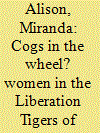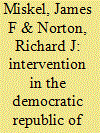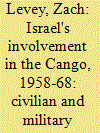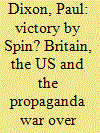|
|
|
Sort Order |
|
|
|
Items / Page
|
|
|
|
|
|
|
| Srl | Item |
| 1 |
ID:
052495


|
|
|
|
|
| Publication |
2003.
|
| Summary/Abstract |
This article examines women's involvement as combatants in the Sri Lankan Tamil guerrilla organisation the Liberation Tigers of Tamil Eelam (LTTE). It addresses women's motivations for choosing to join the organisation, then examines the debate over the LTTE's brand of nationalist feminism before looking at how women's experiences in the movement have affected their views on gender in society. The article hopes to shed some light on the feminist debate about these women, and through this on the broader global feminist debate about women's roles in nationalism and war. The article argues for an analysis of women's involvement in the movement that accords the women agency and is open to certain positive results stemming from their participation, yet recognises the problematic nature of nationalist feminism
|
|
|
|
|
|
|
|
|
|
|
|
|
|
|
|
| 2 |
ID:
052493


|
|
|
| 3 |
ID:
052494


|
|
|
|
|
| Publication |
Winter 2003.
|
| Summary/Abstract |
By 1958 Israel considered ties with the Congo one of its most important economic and foreign policy objectives on the African continent. Yet, previous accounts of Israel's activities in Africa during the 1960s have left its relations with the Congo unexplored. This article examines the civilian and military dimensions of Israeli involvement in the Congo from 1958 to 1968, focusing primarily upon Israel's relationship with the regime in Leopoldville (renamed Kinshasa in 1966). This study evaluates the success of Israeli civilian assistance but demonstrates that Israel's principal contribution to the survival of pro-Western rule in the Congo remained that of significant military assistance which it extended to that regime both before and after Mobutu's 1965 coup.
|
|
|
|
|
|
|
|
|
|
|
|
|
|
|
|
| 4 |
ID:
052497


|
|
|
|
|
| Publication |
Winter 2003.
|
| Summary/Abstract |
This article considers whether NATO won the war in Kosovo by spin, tricking Milosevic into believing that a ground invasion was imminent. It argues that during the conflict over Kosovo the propaganda war for public opinion was perceived by British and US governments as vitally important. NATO elites attempted to address (at least) eleven different audiences with a message appropriate to each. The two key audiences were, first, NATO public opinion which had to be reassured of the legitimacy of NATO's war against Kosovo and was also unsettled about the prospect of deploying ground troops. Simultaneously, NATO attempted to communicate to the second audience, Milosevic and the Serb elite, a more aggressive message that it would take whatever steps were needed to prevail. Using various 'political skills' NATO escalated the propaganda war against Milosevic while attempting to pacify domestic opinion and this may well have played an important role in the capitulation of the Serb leader.
|
|
|
|
|
|
|
|
|
|
|
|
|
|
|
|
| 5 |
ID:
052496


|
|
|
|
|
| Publication |
Winter 2003.
|
| Summary/Abstract |
This article analyses changes in the social structure and stratification of Serbian society in the 1990's and the development of an illiberal economy. These developments are discussed in context of three competing theoretical frameworks here called: the 'transitional' perspective, the 'social breakdown' interpretation, and the perspective of 'social transformation'. The article argues that the two former perspectives imply assumptions of 'transition to liberal democracy and market economy, in the first case, and the possibility of 'reconstruction' of shattered institutions and processes, in the second and that these assumptions need further scrutiny. The metaphor 'social transformation' instead emphasizes the importance of considering the 'actually' existing forms of political economy, survival strategies, social networks, and processes in the region without assuming linear developments of 'reconstruction', or 'transition' towards liberal-democracy cum market economy. The 'language' we use to describe and identify problems, i.e. how we conceptualise, are central also to the policy-implications they have. The development of illiberal forms of economy in the former Yugoslav space, in this case Serbia, may be considered part of a political project in itself. The 'sources' on parallel, often extra-legal, economic forms of activity are very scarce and there is a huge methodological problem in how to access and analyse the character, scope and meaning of this. However, the phenomenon is too important to be avoided just due to a lack of sources, and preliminary analysis and discussion is necessary even though it has of necessity to be based on 'soft' sources. In this article such 'soft' material includes local newspaper material, informal interviews with local informants and preliminary estimations. After having discussed the economy of inflation, examples of black-grey forms of economy, individual survival-strategies, and changes in the stratification of Serbian society this article identifies forces within Serbian society which are supportive of what may be termed the illiberal project and those forces ranged against it. While it may be premature to base any conclusion for which forces may be in the longer-term be sustainable, there is utility in research into both the nature of the illiberal economy, the social networks and forces benefiting from it and the level of cohesion/fragmentation amongst the opposition/resistance to it
|
|
|
|
|
|
|
|
|
|
|
|
|
|
|
|
|
|
|
|
|